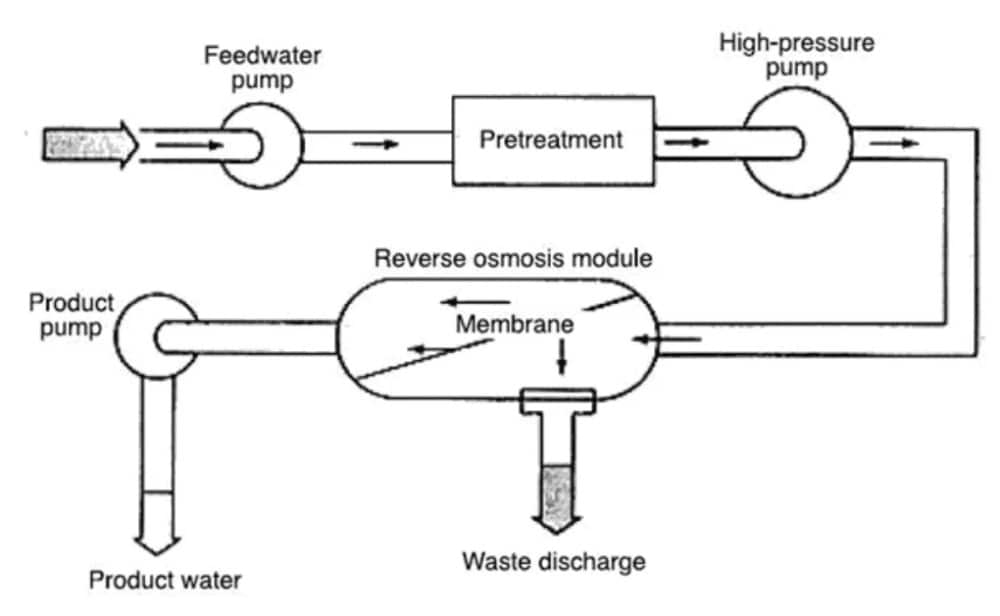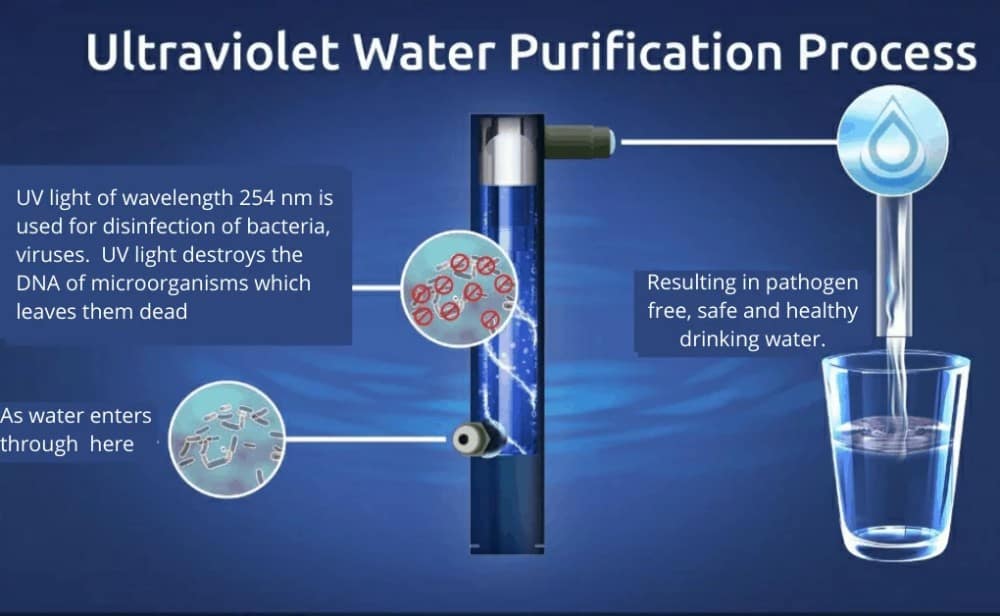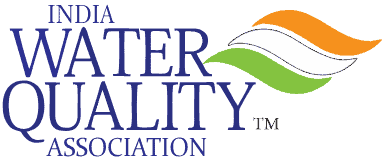RO OR UV?
Drinking clean water is essential for good health. Water is life-giving but the water we drink may be contaminated. We all know that water distributed by the civic authorities travels long distances through old and rusty pipelines before reaching us. And in areas that depend on groundwater, heavy metals, toxic chemicals, and a high TDS (total dissolved solids) value may make the water unfit for direct human consumption. Therefore, water has to be purified properly using the right commercial water purifier when it comes to your family or business needs.
Providing safe drinking water is not just a fundamental necessity but also one of the vital regulations that every employer must adhere to. The commercial use of water, which spans from drinking to various operational needs within the establishment, requires rigorous oversight to ensure safety and quality. In any commercial setting, water plays an indispensable role, and thus its purity can’t be compromised. Paying attention to the wellness of the employees isn’t just a moral duty but is also pivotal for a company’s success.
After all, the well-being of staff members is intricately linked with productivity and morale. Ensuring that the water they consume during work hours is clean and free from contaminants demonstrates an employer’s commitment to their health. This not only builds trust but also positions the establishment as a responsible entity that values its workforce. It’s an investment in the very backbone of the business – its people.
Many businesses and multinational companies use a variety of wellness program initiatives when it comes to their employees’ health. They have gym facilities and free memberships, conduct health fairs, and arrange flu shots. But the primary thing that every company needs to do is to install a commercial water purifier machine system in their office premises. This can benefit the employees the most.
According to the ICRIER study, almost a quarter of the companies lose approximately 14 percent of their annual working days (more than 51 days in a year) due to sickness, and an equal percentage of loss in their productivity and profits which is a cause for concern. The study reveals that absenteeism was mainly due to acute diseases like diarrhea, influenza, malaria, flu, and the common cold followed by lifestyle diseases like cardiovascular diseases, diabetes, and strokes.
During the monsoon months in India, which accounts for 33% of the year, the prevalence of water-borne diseases takes a toll on employees’ health, and the absenteeism curve rises. Hence supplying your employees with purified water could mean fewer sick days, less paid time off, and increased health and well-being throughout the year.
The most popular type of commercial water purifiers available in the market includes RO (reverse osmosis) and UV (ultraviolet). Let’s find out a little more about them.
Reverse Osmosis (RO) Water Purifier System
Reverse Osmosis is a technology that removes contaminants from feed water when pressure forces it through a semi-permeable membrane. Water flows from the more concentrated side (more contaminants) of the RO membrane to the less concentrated side (fewer contaminants) to provide clean drinking water. The freshwater produced is called permeate. The concentrated water left over is called waste or rejected.
A semi-permeable membrane has small pores which prevent contaminants from passing through while allowing water molecules to pass through. Water becomes more concentrated as it passes through the membrane in osmosis to achieve equilibrium on both sides. However, reverse osmosis prevents contaminants from entering the less concentrated side of the membrane. When pressure is applied to a volume of saltwater, for example, the salt is left behind and only clean water flows through.

Advantages of Reverse Osmosis
The machines with commercial RO purification technology can remove up to 95 % TDS which is its most salient feature and advantage. It stands out from the other purification methods as it is one of the most effective methods certified by the EPA (Environmental Protection Agency) to remove dissolved impurities in water that are otherwise impossible to filter using traditional filtration technology.
World Health Organization (WHO) which is an international body has reviewed the harmful effects of heavy metals on the body. Consumption of Arsenic can cause skin cancer and some other cancers also it can cause skin lesions like pigmentation changes and hyperkeratosis. Consumption of Cadmium can cause kidney damage while consumption of Lead has neurotoxic effects. All the above heavy metals can be removed by a commercial RO water purifierCommercial RO purification machines greatly enhance the taste of the water by removing all the dissolved impurities present in it. In areas that depend on groundwater with high TDS and hardness levels, RO water purifiers turn the water into potable water by removing these contaminants from it.
Disadvantages of Reverse Osmosis (RO)
The small pores of the commercial RO membrane can become clogged with use over time. Thus, a pre-filter should be present in the purifying system to prolong the life of the membrane.
Over time, RO membranes tend to get coated with a film of microorganisms and this causes biofouling of the surface. This bio-fouling allows the membrane pores to get eaten into by the bacteria which is stuck on its surface. The membrane pores increase in size and allow live bacteria to pass to the other side of the membrane where the pure permeate is collected. This contaminates the water purified by the RO unit and self-defeats the process of purification. This is a serious limitation of a RO membrane. To address this risk, disinfection post RO membrane is required for endpoint purification. UV becomes imperative in such cases.
Wastage of water is another big disadvantage of RO purification systems. Most commercial RO purification systems recover only up to 25% of water while the remaining 75% goes into the drain. Therefore, knowing when and under what conditions to use a RO system becomes a compelling question.
RO membranes reduce the TDS content in water by almost 90%. So, when TDS levels post RO purification fall below desirable limits, not only is water stripped of essential minerals but may end up with a bitter taste. This is not beneficial in the long run.
UV Water Purifier System
UV (Ultraviolet) rays are used in a commercial UV water purification system to kill harmful bacteria in the water making water pathogen-free. This system can kill harmful pathogens and can be combined with pre-filtration to make it highly effective. Commercial UV water purifiers are beneficial to health because they kill all harmful microbes in the water without affecting the taste.
The commercial UV water purifier makes water-borne pathogens inactive by exposing them to UV rays. It uses a UV light source that is mounted in such a manner within a closed chamber such that when water passes through the chamber, UV light penetrates the cells of bacteria and destroys their ability to reproduce.

Advantages of UV purification
- Reliable and consistent UV disinfection efficiency
- High quality and affordability
- Simple installation and maintenance. Compact units require minimum space.
- Easily adaptable to varied site conditions.
Disadvantages of a UV water purifier
- UV water purifiers kill bacteria and viruses but do not remove dissolved impurities like pesticides, rust, arsenic, fluoride, and other contaminants. It does not transform hard water into sweet, soft water.
- When water contains suspended impurities, UV rays cannot penetrate the cells effectively and hence cannot disinfect thoroughly. If the water is muddy, it must first pass through an effective filtration system before passing through the UV water purifier.
- The presence of electricity is required to make a UV system work.
Conclusion
To determine the best commercial water purifier for one’s business, one must first understand the source and quality of water in that area. Groundwater with high TDS levels (more than 500 PPM) may have an adverse effect on the taste of water, and if consumed untreated, may cause serious gastrointestinal issues. In this case, a commercial RO water purifier can serve the purpose and may be the best option.
Surface water supplied by the municipal corporation has low TDS (less than 500 PPM), and an RO purifier may not be required. In this case, one can select a UV water purifier so that endpoint disinfection and protection from water-borne pathogens are assured. Because the sizing of a UV system and the correct dosage of UV energy are so important, checking the brand’s credibility in the market is one of the crucial factors when selecting the best commercial water purifier for your business.

